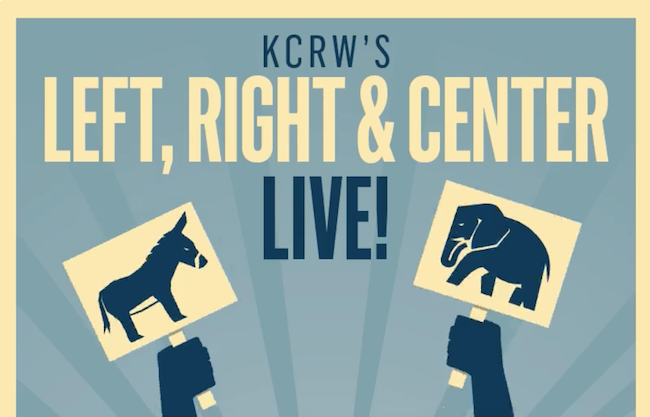By Sara Worth
Last Thursday, a special edition of KCRW’s Left, Right & Center was presented live at the United Artists Theater at the downtown Ace Hotel. It felt strange to be honoring these two holdover mediums — radio and theater — during an election cycle shaped more by TV news and internet memes. But the night’s sole focus was on talk.
The evening was, in many ways, a reintroduction to the familiar — starting with the stranger who came onstage to open the event with the words, “Hello, my name is Steve Chiotakis.” As a native Angeleno I grew up with that voice, but until Thursday could not have picked the All Things Considered anchor out of a lineup.
The 2016 Presidential election has offered less-welcome reintroductions: to the Clintons’ “vast right-wing conspiracy”; to Donald Trump and his many schemes and indiscretions; and to the intractable themes and power dynamics that shape our politics and our national discourse. Rather than reflect the progress we have made over the past eight years, our so-called discourse has devolved into a debate over the most basic of political questions: Will the candidates accept the results of the election as willed by the people? Was this country founded upon the principle of religious freedom? Do words matter?
How did we get here? We can probably thank Donald, for his playground gibing and refusal (or inability) to hold a discussion beyond 140 characters and a third grade reading level.
As LRC host Josh Barro (representing the “Center”) pointed out, Trump pulled ahead in a crowded primary by acting like a bully, coining nicknames like Little Marco and Lyin’ Ted. He attracted supporters with his willingness to eschew so-called “political correctness” in favor of telling it like it is: Mexican immigrants are “rapists,” women are objects rated 1-10, and nearly everything about America is a “disaster.”
Barro asked the panel to assess the impact such “nasty rhetoric” has had on our national discourse. Their responses all assumed that the impact of bad words can be measured by the bad deeds they suggest or represent; but there was disagreement over whether Trump’s nasty rhetoric necessarily means nasty policy.
Generally, those left-of-center seemed to think that Trump’s words have teeth. Sparring with journalist and guest Mickey Kaus, economist Gene Sperling (Left) drew a distinction between a lack of “table manners” and Trumps’ language, which suggests actual “discrimination.” Journalist and guest Keli Goff echoed Sperling, telling Kaus that as a white man he has the luxury of focusing on the “issues” (in this case, trade) instead of Trump’s hateful rhetoric. He need not worry about hate speech, because he need not worry about hate.
In contrast, those right-of-center seemed to maintain that Trump’s words are just words. Mona Charen (Right) lamented that Trump has “slogans” but no “answers” for disaffected whites. And Kaus dismissed the idea that Trump actually intends to ban Muslims or build The Wall; those are just words. (You know, locker room talk.)
Meanwhile, at the bar, KCRW was serving up a cocktail called “The Mexican Wall.” (The bartender assured me it was “very huge and very beautiful,” but I had to pay for it myself.)
That’s because despite what pundits may say about their materiality, we remember words. We remember “binders full of women,” we remember “I am not a crook,” and I am confident that we will remember “nasty woman” and “bad hombres” for many years to come. And we instinctively believe, on a very basic level, that bad words = bad man.
But what if our focus on bad words proves a distraction from bad deeds? Sperling (Left) compared Trump negatively with former Republican Presidential candidate John McCain, who corrected a woman at 2008 a rally who claimed his opponent, then-Senator Barack Obama, was “an Arab.” McCain, who was booed, may have stood up for the discourse then, but he is certainly no friend to the Left.
Likewise, the only difference between Trump and his running mate Mike Pence on most issues is vocabulary. Trump boasts of grabbing pussies, but Pence mandated fetus funerals in Indiana.
And our focus on Trump’s words further debases the discourse by preventing us from analyzing the positions of his opponent—in ways both favorable and unfavorable to her campaign.
Yet this election has become a referendum on words: which words Clinton and Obama will or won’t use to describe terrorism; the words Trump says on tape and whether they describe real actions; whether Clinton is “all talk and no action”; how our kids shouldn’t hear Trump’s “divisive rhetoric”; whether Hillary will keep her (public) word, and what she really said in private.
Words stick: it’s much easier to follow the morality play we stage every four years than to sift through the deluge of disinformation offered on the Internet. Words also stick because The Media (to borrow the generalized language of internet conspiracy theorists) prefers spectacle to scrutiny, and Trump embodies that winning reality show meme, “I’m not here to make friends.”
Words may distract, but they do matter. Even if they don’t incite actions or suggest policy positions, the words each camp chooses to use can serve as important identifiers, dog-whistles, and promises to the American people about what and who they will stand for as President. The candidate who serves up only nasty rhetoric, even in jest, is self-identifying as nasty.
LRC Live’s subtitle, “Inside the Political Circus,” underscored that time-old American insistence on politics as entertainment. But 2016 may be remembered as the year when creepy clowns started terrorizing our streets, and the political circus stopped being fun. It was the year that Donald J. Trump entered the ring — first as farce, then as tragedy.
If Trump is PT Barnum (without the political idealism), we can only hope that his Greatest Show on Earth may finally end on November 8th. But with Trump TV promising HUGE ratings, we’re in for a lot more nasty rhetoric.


